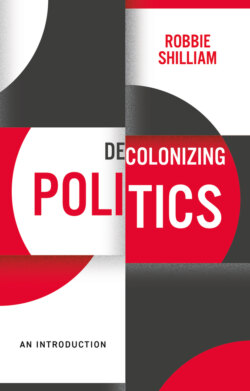Читать книгу Decolonizing Politics - Robbie Shilliam - Страница 7
–1– Introduction
ОглавлениеLet’s start with a figure who is conventionally known as the “father” of political science – Aristotle. You might think this strange for a book that seeks to decolonize the study of politics: isn’t Aristotle a very Eurocentric departure point? Not if you asked Aristotle. He categorized Europeans as barbarians. Paul Cartledge (1993, 5), an eminent historian of the classical world, describes the ancient Greeks as “desperately foreign” to our Western sensibilities. Or how about Derek Walcott, famous Saint Lucian poet and Nobel Prize winner, who compares the Aegean and Caribbean seas and finds much in common:
If we looked at them now, we would say that the Greeks had Puerto Rican tastes. Right? Because the stones were painted brightly. They were not these bleached stones. Time went by, and they sort of whitened and weathered, the classics began to be thought of as something bleached-out and rain-spotted, distant. (Brown and Johnson 1996, 183).
Perhaps Aristotle is not so much a strange departure point as an uncanny one. Investigating the place of aboriginal ideas of the sacred in mainstream Australian society, Ken Gelder and Jane Jacobs (1995, 171) define the uncanny as “the combination of the familiar and the unfamiliar – the way the one seems always to inhabit the other.” Aristotle is familiar: we are used to conceiving of him as the progenitor of a European science of politics. Yet he is also unfamiliar: in fact, Aristotle was not European, so what does that make of the purportedly European tradition of studying politics?
Facing the uncanny unsettles our assumptions in an intimate fashion. Intimacy is important. There’s an easy option to decolonizing the study of politics. You can simply search for the most exotic forms of politics around the world and revel in their alien-ness. But in doing so, you’d keep the “familiar” familiar and the “unfamiliar” unfamiliar. There would be no intimate engagement there between “them” and “us.” No question raised as to what counts as “exotic’ to whom and why. No stakes at play.
Put another way, if you moved your focus to a study of the “margins” only, then that would leave the “center” intact. Your movement would thereby avoid difficult but compelling questions such as: Who made their lives central and other peoples’ lives marginal? And, by what logics are the margins divided from the center? There are many different kinds of centers and margins. In this book we are going to focus on imperial centers and colonial margins. We will be decolonizing the study of politics by rethinking both these centers and margins; but to do that we will have to take marginalized perspectives seriously.
Empirically, imperialism pertains to the expansion of a polity’s influence or dominion through usually militaristic but also economic and diplomatic means. Imperial administration is a hierarchical affair, with a center that is served by a diverse set of peripheries. Imperialism is mostly a violent affair in so far as it forces the center of some peoples’ worlds to become the margins of another people’s world. Colonialism is principally about governing those marginal populations. Such governance can take many forms. I will draw attention to two here. Firstly, there is an indirect kind of colonial rule whereby a small coterie of foreign administrators (usually from the imperial center) appoint indigenous “chiefs” to rule over “tribes” on their behalf. Think of Ghana. The second version is where populations from the imperial center colonize and settle lands and govern themselves while also ruling over indigenous peoples. In this instance, settlers often become the majority due to land dispossession and other techniques of genocide. Think of New Zealand.
You might say that empires and colonies no longer exist. A few colonies still do, but let me grant the point. However, the claim I will make in this book is that political science remains indebted to approaches, debates and categories that emerged to make sense of the challenges that imperial centers faced in ruling over the colonial margins that they had created. In this respect, empire and colonialism are formative phenomena in the study of politics. Case in point: our uncanny Aristotle, who was born into a colonial world.
